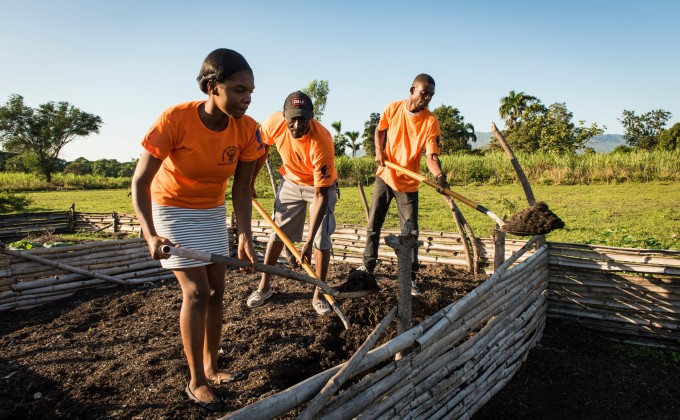In Haiti, nearly 98% of the land has been deforested in just over two centuries of resource exploitation. The deforestation has significantly reduced the resilience of ecosystems, exacerbating the negative effects of climate change on populations.
The purpose of the KLIMA project (Konbit pou LIte kont Chanjman kliMAtik) is to support communities and local partners in the Nord and Nord-Est regions of Haiti in their efforts to combat climate change, in particular by improving ecosystem resilience, and to provide them guidance in developing a sustainable, green economy.
The KLIMA project has teamed up with Quebec company Viridis Terra International (VTI) and is receiving support from CECI’s volunteer cooperation program to reduce greenhouse gas emissions by creating sustainable energy forests and setting up a system to recycle organic waste through composting. The project also has a component through which it provides training and raises awareness among the affected populations.
Reducing pressure on forest resources
The overexploitation of wood resources and the persistent environmental degradation that has ensued has left the Cap-Haïtien / Fort-Liberté region highly vulnerable to increasingly extreme weather events. The several hundred thousand tonnes of charcoal required each year to meet the population’s needs has placed a great deal of pressure on the remaining forest cover.
The KLIMA project aims to reduce greenhouse gas (GHG) emissions caused by deforestation and heavy charcoal use, thereby reducing pressure on forest resources. It has facilitated the planting and development of productive, short-rotation energy forests. These sustainably managed and harvested forests will improve the resilience of ecosystems on degraded non-agricultural lands and provide a new source of renewable, carbon-neutral energy. The project has set up 200 hectares of energy forest schools by working primarily with 180 small landowners.
Sustainable management and recycling of organic waste
The second component of the KLIMA project involves setting up a pilot system for organic waste management and recycling through composting in Dubré, in the Milot municipality. Cap-Haïtien is the country’s second largest city, with a population of 442,000, and produces 80,700 tons of solid waste every year that is stored at the dump site in Fort Saint-Michel. Two thirds of this waste is organic—a massive amount of material with potential for transformation into eco-industrial compost.
The two main objectives of this component are to reduce methane emissions from organic waste deposits (a greenhouse gas 21 times more powerful than CO2 in global warming potential) and to provide a significant source of green manure for the region's farmers.
In addition to directly and indirectly creating jobs, composting organic waste has a direct impact on sanitation in the greater Cap-Haïtien area and offers an alternative to using agricultural chemicals imported from the United States, such as for banana production.
Through these two components (setting up sustainable energy forests and a system for recycling organic waste through composting), the KLIMA project will reduce GHG emissions by 55,288 kilotonnes of CO2 equivalent, equal to the GHG emissions of 12,210 vehicles per year.
Raising awareness through local partners
To build community awareness and buy-in for the fight against climate change, the project is conducting a number of awareness-raising and training activities on climate issues and adaptation measures in Haiti’s Nord and Nord-Est departments. It has also held workshops demonstrating the technical innovations introduced by KLIMA.
To ensure strong community buy-in for fighting climate change and that actions are tailored to the region’s needs, we designed the project by working closely with local partners, whose technical and organizational capacities will be strengthened through training, coaching and consulting. One such partner is the Young Agricultural Entrepreneurs of Nord (Jeunes Entrepreneurs Agricoles du Nord, JEAN), which provides technical support to producers in the region: final selections of tree species, demonstration workshops on good practices, transforming wood energy using energy-efficient carbonizing school ovens, etc. The Youth in Action Organization (YAO) is has set up a flagship centre for sorting and composting waste, and to produce and commercialize compost. Students and CHCL faculty are involved in training activities and research projects. The partner organizations have been supported by five Uniterra program volunteers.
Proyectos
Presencia
El CECI
Implicarse
Informarse
Donar
Contáctenos
Enlaces externos






